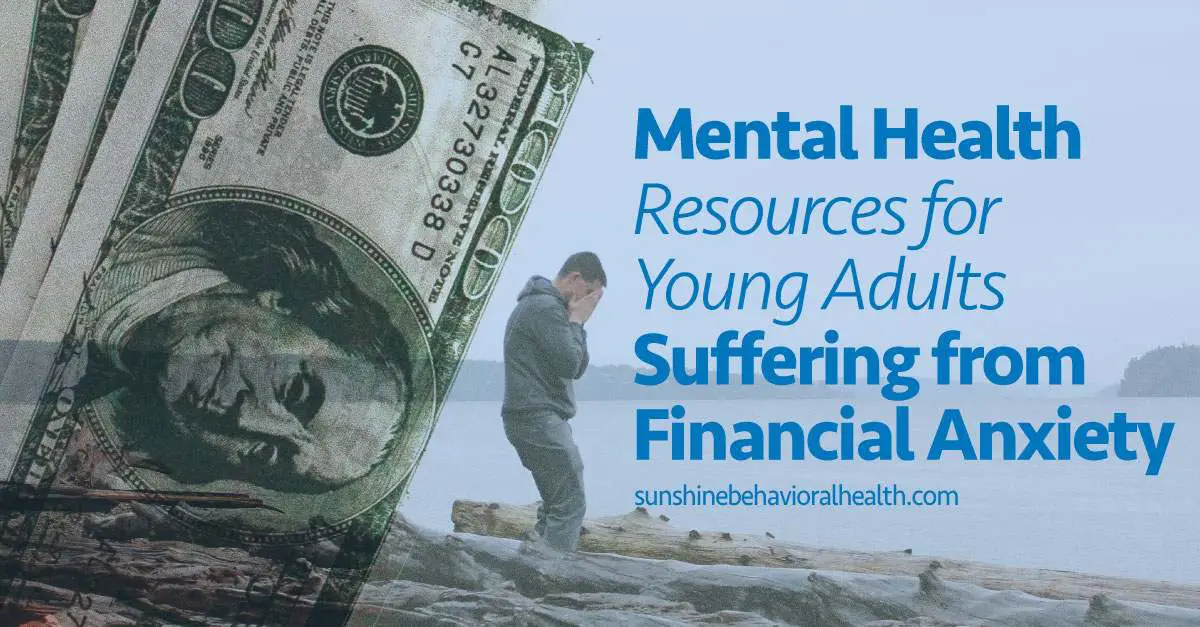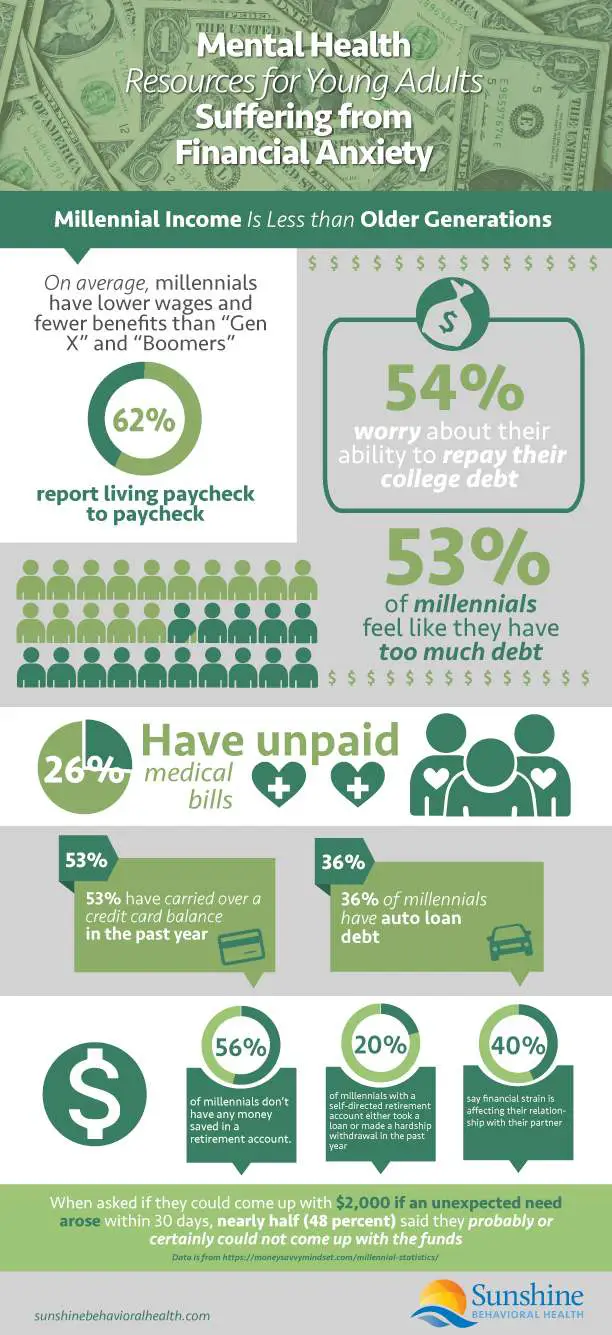In today’s economic climate, Centennials and Millenials have their work cut out for them with massive debt loads, an increasingly competitive job market, and an ever-fluctuating economy. Not surprisingly, financial anxiety among young adults has become quite common but the good news is: there are many mental health resources available to help you overcome anxiety’s effects in your life.
The United States has long been known as the land of opportunity where anyone who works hard can expect to live a good life. Unfortunately, things have changed since the start of the 21st century, leaving more than a few young adults concerned about their financial future. As a result, financial anxiety among Millennials and young adults, in general, has become common.
Anxiety, in any form, can wreak havoc on your ability to handle daily life stressors, not to mention the toll it takes on your health and sense of well-being. While feeling anxious every now and then is to be expected, it’s time to take action when feeling anxious becomes the norm rather than the exception. Mental health resources for young adults offer free and low-cost ways to take back control of your life from money worries and develop healthy ways of coping with today’s economic climate.
What’s Causing Financial Anxiety Among Young Adults?
Since its inception, the American dream has promised a good life to anyone willing to work hard. In turn, succeeding generations have typically done better, money-wise, than their parents or the generation that’s gone before. This has not been the case for today’s young adults.
Generations Z (Centennials) and Y (Millennials) have encountered some considerable setbacks when it comes to grabbing ahold of the American dream, including:
- Massive student loan debt
- The Great Recession of 2007 to 2009
- “Last man on the totem pole” in the workplace or last hired, first fired
- Limited ability to generate savings
Many Gen Zs and Ys have or are entering adulthood with record levels of student debt. In the mid-1990s, only half of bachelor degree recipients carried college debt, which averages around $15,000. By 2014, two-thirds of graduates with bachelor’s degrees had outstanding loans, averaging around $27,000.
Whereas median household incomes continued to increase up until 1999, growth has remained stagnant since that time with household incomes staying below 1999 levels. Add to this the lingering effects of the Great Recession coupled with rapid technological changes in the workforce and young people continue to face lower levels of personal income and wealth than previous generations. Considering the state of today’s workforce and economy, financial anxiety among young adults is well warranted.
When Anxiety Becomes an Anxiety Disorder
Financial anxiety is nothing new in America but hope for better days has always had a way of helping cash-strapped families stay the course. Unfortunately, the ongoing hits to the American economy over the past two decades have been the norm for young adults in the workplace. This kind of economic climate can make it difficult for someone to hope for better days when they have no point of reference to go by.
While many young adults have learned to cope with things as they are, today’s trends create prime conditions for feelings of anxiety to become a way of life. And there lies the difference between occasional worry and the makings for an anxiety disorder. When feelings of anxiety persist over long periods, the risk of developing a full-blown anxiety disorder increases dramatically.
Anxiety disorders can take different forms depending on a person’s circumstances. The three most common forms include:
- Generalized anxiety – worrying, every day, over major issues, like money, family, health, or work that persist for six months or longer
- Panic attacks – repeated episodes of sudden, intense, crippling fear when no danger is present
- Phobias – intense fears that are specific, such as a fear of spiders or crowded places
As with any mental health problem, ignoring recurring anxiety only allows your symptoms to intensify. What may start out as random passing episodes of worry can reach a point where your relationships and your ability to function at work or school start to suffer. For these reasons, young adults suffering from anxiety may want to look into available treatment options before things get worse.
Financial Woes and Their Effects on Your Health
While financial anxiety among Millennials and Gen Zs may be warranted,money problems have ranked as the number one source of stress for three out of every four Americans well before the Great Recession even started. However, the effects of having grown up inside a troubled economy still place young people at increased risk of experiencing the effects of anxiety in their daily lives. Here are just a few effects that ongoing financial anxiety can have in a person’s life:
Physical and Behavioral Effects
Worrying about money issues for weeks or months at a time takes a toll on the body’s health and will inevitably impact your ability to meet your daily responsibilities. A 2018 Planning & Progress study conducted by Northwestern Mutual examined current attitudes and behaviors of U. S. adults regarding money and financial security. Researchers surveyed 2,003 adults, of which 601 respondents were Millennials. Results from the study revealed a whopping 23 percent of Millennials reported becoming physically ill on a weekly or monthly basis as a result of financial stressors. Job performance-wise, 28 percent of Millennials said financial anxiety affected their job performance on an ongoing basis.
As a group, young adults tend to be healthier than their older counterparts, but that doesn’t necessarily protect you from the damaging effects of anxiety on your health. Young adults suffering from anxiety stand to experience serious health consequences when anxiety goes untreated. Health issues may take the form of:
- Gastrointestinal problems, including ulcers and IBS
- Damage to your cardiovascular system
- Weakened immune system
- Aging faster than normal
- Decreased fertility
- Increased risk for premature death
Psychological Effects
When left to its own devices, worry can snowball out of control, creating a state of chronic fear in the process. Like any strong emotion, chronic fear sets off a cascade of chemical activities in the brain and body that keep you on high alert. Over time, these effects cause damage to areas of the brain, particularly the hippocampus. Damage to the hippocampus makes it even harder to control anxiety states, which can leave you feeling anxious all the time.
Here are some other effects of chronic fear:
- Impairs decision-making processes
- Make you more impulsive
- Feeling fatigued most of the time
- Depression
Ultimately, when financial anxiety among Millennials and young adults as a group persists, it can all but cripple their ability to manage their daily lives.
Substance Use Disorder Risks
Mental health problems and substance use disorder can co-occur quite often and when they do, a vicious cycle soon takes shape. An estimated 20 percent of Americans with anxiety and depression-based disorders have a substance use disorder problem. On the flip-side, about 20 percent of people with substance use disorder problems struggle with mental health issues.
Conditions like anxiety and depression tend to make individuals more susceptible to the “high” effects of substance use disorder to the point where a person may use drugs and alcohol to gain relief from feelings of anxiety or sadness. The problem with this is the damaging effects of these substances not only breeds addiction but also makes depression and anxiety symptoms worse.
Under these conditions, it’s easy to fall into a vicious cycle of self-medication and worsening symptoms. So what may have started out as occasional anxiousness soon turns into a full-blown anxiety disorder. Mental health resources for young adults struggling with financial anxiety are there to help you regain control of worrisome tendencies and develop healthy ways of coping with money issues. First founded in 1979, the Anxiety and Depression Association of America is an international, non-profit organization committed to helping individuals struggling with depression find the help they need. Anxiety and depression tend to go hand-in-hand when feelings of anxiety persist for weeks or years at a time. People struggling with feelings of anxiety for weeks or months at a time. This mental health resource for young adults and adults, in general, offers a vast array of benefits, including: Call 1a800a662aHELP The Substance Use Disorder and Mental Health Services Administration, also known as SAMHSA, offers a confidential, national hotline for anyone struggling with symptoms of anxiety, depression, or mental health issues in general. The hotline takes calls seven days a week on a 24-hour-a-day basis. Phone reps can provide you with information on where to find local drug rehab facilities, support groups, and community-based organizations that provide mental health support. As a mental health resource for young adults, this one can connect you with a host of service providers in your local area. The Livewell Foundation is another mental health resource for young adults that helps individuals overcome depression in their daily lives. Again, if you’ve been dealing with anxiety for a while now, feelings of depression can easily creep in due to the effects persistent anxiety can have on the brain’s chemical system. Since anxiety and depression symptoms tend to feed off one another, it’s important to treat both conditions together as opposed to treating one versus the other. Livewell Foundation takes a slightly different treatment support approach in that they run a peer support network where individuals can help each other work through everyday stressors and challenges. Research studies have shown peer support networks to be highly effective as a treatment for clinical depression in that they encourage peer engagement and feelings of self-empowerment. The Livewell Foundation uses trained volunteers to run the networks and many of these volunteers have benefited from the program. 7 Cups, another unique mental health resource for young adults, offers one-on-one chat for anyone who needs a listening ear. Also run by trained volunteers, 7 Cups “listeners” aren’t there to judge you or solve problems but rather provide an outlet where you can talk through whatever issues are on your mind. 7 Cups also has active online user community groups for anxiety, depression, addictions, and many more. And if you’re looking for a credentialed listener, the site also offers online therapy sessions with licensed therapists for a monthly fee. Holistic Ways to Defeat Anxiety – Sunshine Behavioral Health Shareable Resources on Anxiety Disorders – National Institute of Mental Health Self Help Resources – U. S. Department of Veterans Affairs Anxiety Disorders – Womenshealth.gov Lifeline – National Suicide Prevention Lifeline
Mental Health Resources for Managing Financial Anxiety
Anxiety and Depression Association of America (ADAA)
SAMHSA National Hotline
Livewell Foundation
7 Cups
A Few More Links to Checkout:
Don’t Underestimate Anxiety …Get the Help You Need
Everyone experiences anxiety at some point in life but there’s a difference between feeling anxious every now and then and feeling anxious all the time. Chronic anxiety can wreak havoc on your physical and emotional well-being and throwing back a couple of drinks or popping a couple of pills will only make things worse. While financial anxiety among young adults may well be warranted, you don’t have to live with it. Get the help you need.
Sources
Medical disclaimer:
Sunshine Behavioral Health strives to help people who are facing substance abuse, addiction, mental health disorders, or a combination of these conditions. It does this by providing compassionate care and evidence-based content that addresses health, treatment, and recovery.
Licensed medical professionals review material we publish on our site. The material is not a substitute for qualified medical diagnoses, treatment, or advice. It should not be used to replace the suggestions of your personal physician or other health care professionals.







